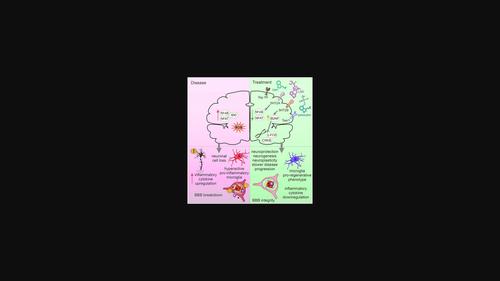当前位置:
X-MOL 学术
›
J. Neurochem.
›
论文详情
Our official English website, www.x-mol.net, welcomes your
feedback! (Note: you will need to create a separate account there.)
From psychiatry to neurology: Psychedelics as prospective therapeutics for neurodegenerative disorders
Journal of Neurochemistry ( IF 4.2 ) Pub Date : 2021-09-13 , DOI: 10.1111/jnc.15509 Urszula Kozlowska 1, 2 , Charles Nichols 3 , Kalina Wiatr 2 , Maciej Figiel 2
Journal of Neurochemistry ( IF 4.2 ) Pub Date : 2021-09-13 , DOI: 10.1111/jnc.15509 Urszula Kozlowska 1, 2 , Charles Nichols 3 , Kalina Wiatr 2 , Maciej Figiel 2
Affiliation

|
The studies of psychedelics, especially psychedelic tryptamines like psilocybin, are rapidly gaining interest in neuroscience research. Much of this interest stems from recent clinical studies demonstrating that they have a unique ability to improve the debilitating symptoms of major depressive disorder (MDD) long-term after only a single treatment. Indeed, the Food and Drug Administration (FDA) has recently designated two Phase III clinical trials studying the ability of psilocybin to treat forms of MDD with "Breakthrough Therapy" status. If successful, the use of psychedelics to treat psychiatric diseases like depression would be revolutionary. As more evidence appears in the scientific literature to support their use in psychiatry to treat MDD on and substance use disorders (SUD), recent studies with rodents revealed that their therapeutic effects might extend beyond treating MDD and SUD. For example, psychedelics may have efficacy in the treatment and prevention of brain injury and neurodegenerative diseases such as Alzheimer's Disease. Preclinical work has highlighted psychedelics’ ability to induce neuroplasticity and synaptogenesis, and neural progenitor cell proliferation. Psychedelics may also act as immunomodulators by reducing levels of proinflammatory biomarkers, including IL-1β, IL-6, and tumor necrosis factor-α (TNF-α). Their exact molecular mechanisms, and induction of cellular interactions, especially between neural and glial cells, leading to therapeutic efficacy, remain to be determined. In this review, we discuss recent findings and information on how psychedelics may act therapeutically on cells within the central nervous system (CNS) during brain injuries and neurodegenerative diseases.
中文翻译:

从精神病学到神经病学:迷幻药作为神经退行性疾病的前瞻性疗法
迷幻剂的研究,尤其是像裸盖菇素这样的迷幻色胺,正在迅速引起神经科学研究的兴趣。这种兴趣大部分源于最近的临床研究,表明它们具有独特的能力,可以在仅一次治疗后长期改善重度抑郁症 (MDD) 的衰弱症状。事实上,美国食品和药物管理局 (FDA) 最近指定了两项 III 期临床试验,研究裸盖菇素治疗具有“突破性治疗”状态的 MDD 的能力。如果成功,使用迷幻药治疗抑郁症等精神疾病将是革命性的。随着科学文献中出现更多证据支持它们在精神病学中用于治疗 MDD 和物质使用障碍 (SUD),最近对啮齿动物的研究表明,它们的治疗效果可能超出治疗 MDD 和 SUD 的范围。例如,迷幻剂可能对治疗和预防脑损伤和神经退行性疾病(如阿尔茨海默病)有效。临床前工作强调了迷幻药诱导神经可塑性和突触发生以及神经祖细胞增殖的能力。迷幻药还可以通过降低促炎生物标志物(包括 IL-1β、IL-6 和肿瘤坏死因子-α (TNF-α))的水平来充当免疫调节剂。它们的确切分子机制,以及细胞相互作用的诱导,特别是神经细胞和神经胶质细胞之间的相互作用,从而导致治疗效果,仍有待确定。在本次审查中,
更新日期:2021-09-13
中文翻译:

从精神病学到神经病学:迷幻药作为神经退行性疾病的前瞻性疗法
迷幻剂的研究,尤其是像裸盖菇素这样的迷幻色胺,正在迅速引起神经科学研究的兴趣。这种兴趣大部分源于最近的临床研究,表明它们具有独特的能力,可以在仅一次治疗后长期改善重度抑郁症 (MDD) 的衰弱症状。事实上,美国食品和药物管理局 (FDA) 最近指定了两项 III 期临床试验,研究裸盖菇素治疗具有“突破性治疗”状态的 MDD 的能力。如果成功,使用迷幻药治疗抑郁症等精神疾病将是革命性的。随着科学文献中出现更多证据支持它们在精神病学中用于治疗 MDD 和物质使用障碍 (SUD),最近对啮齿动物的研究表明,它们的治疗效果可能超出治疗 MDD 和 SUD 的范围。例如,迷幻剂可能对治疗和预防脑损伤和神经退行性疾病(如阿尔茨海默病)有效。临床前工作强调了迷幻药诱导神经可塑性和突触发生以及神经祖细胞增殖的能力。迷幻药还可以通过降低促炎生物标志物(包括 IL-1β、IL-6 和肿瘤坏死因子-α (TNF-α))的水平来充当免疫调节剂。它们的确切分子机制,以及细胞相互作用的诱导,特别是神经细胞和神经胶质细胞之间的相互作用,从而导致治疗效果,仍有待确定。在本次审查中,











































 京公网安备 11010802027423号
京公网安备 11010802027423号